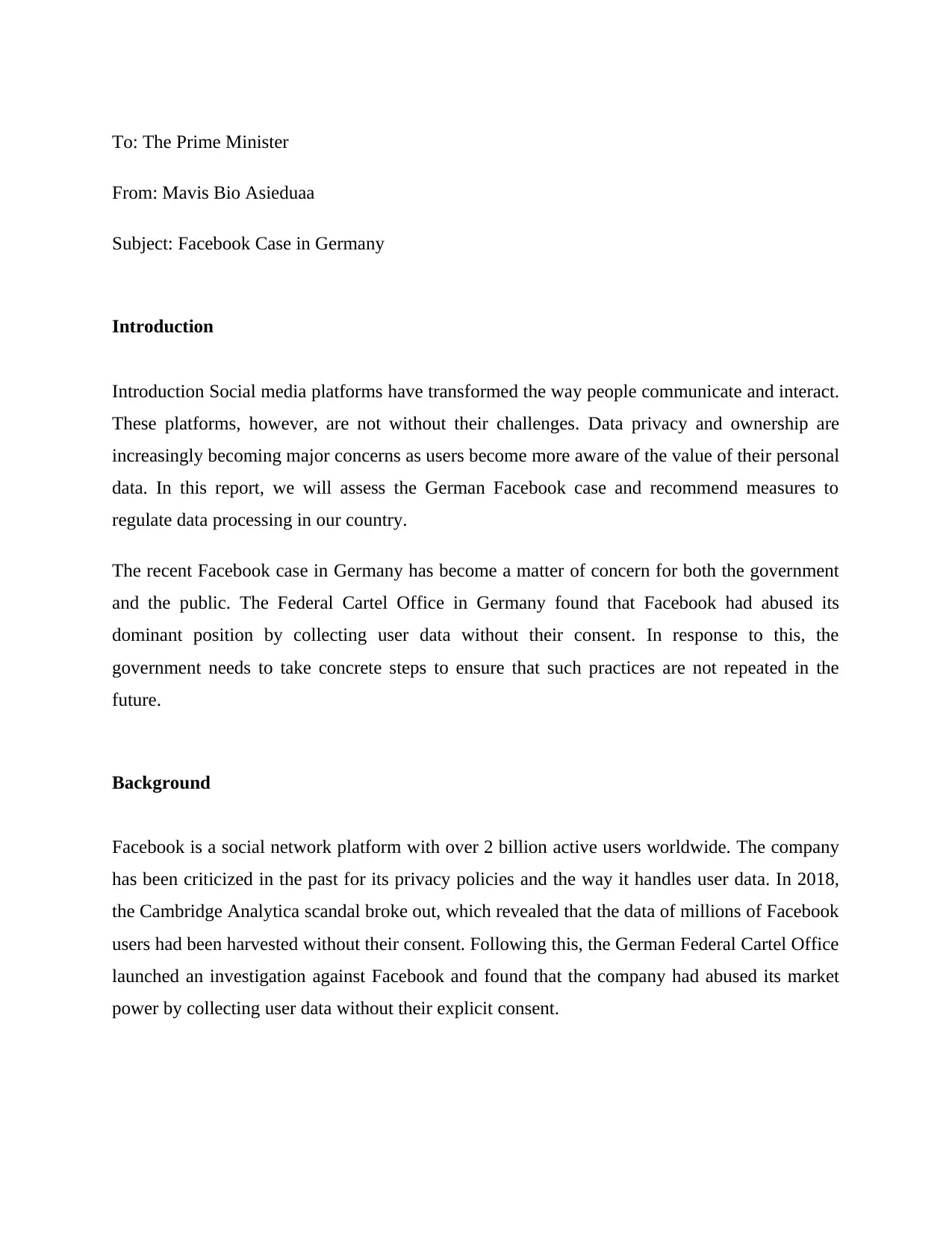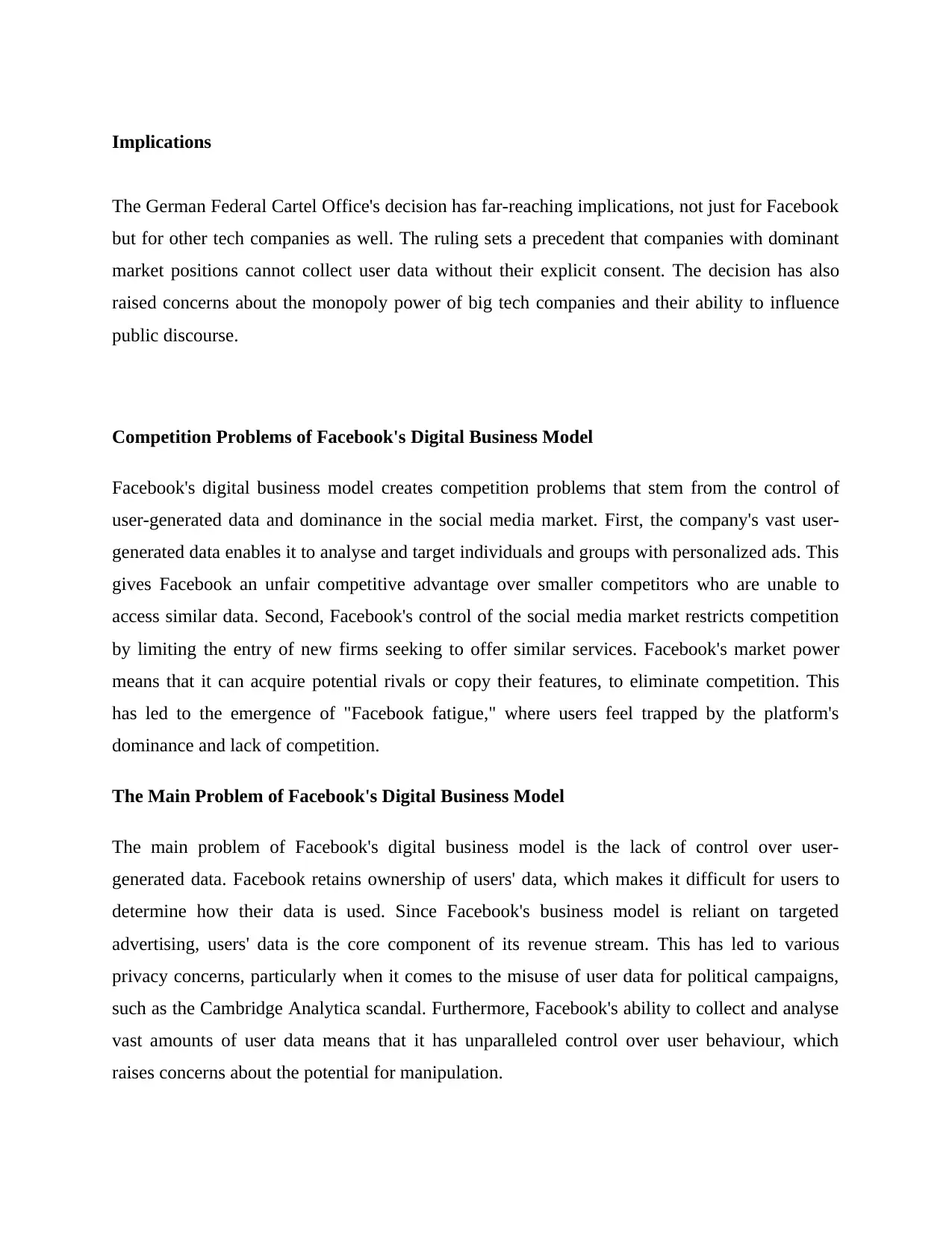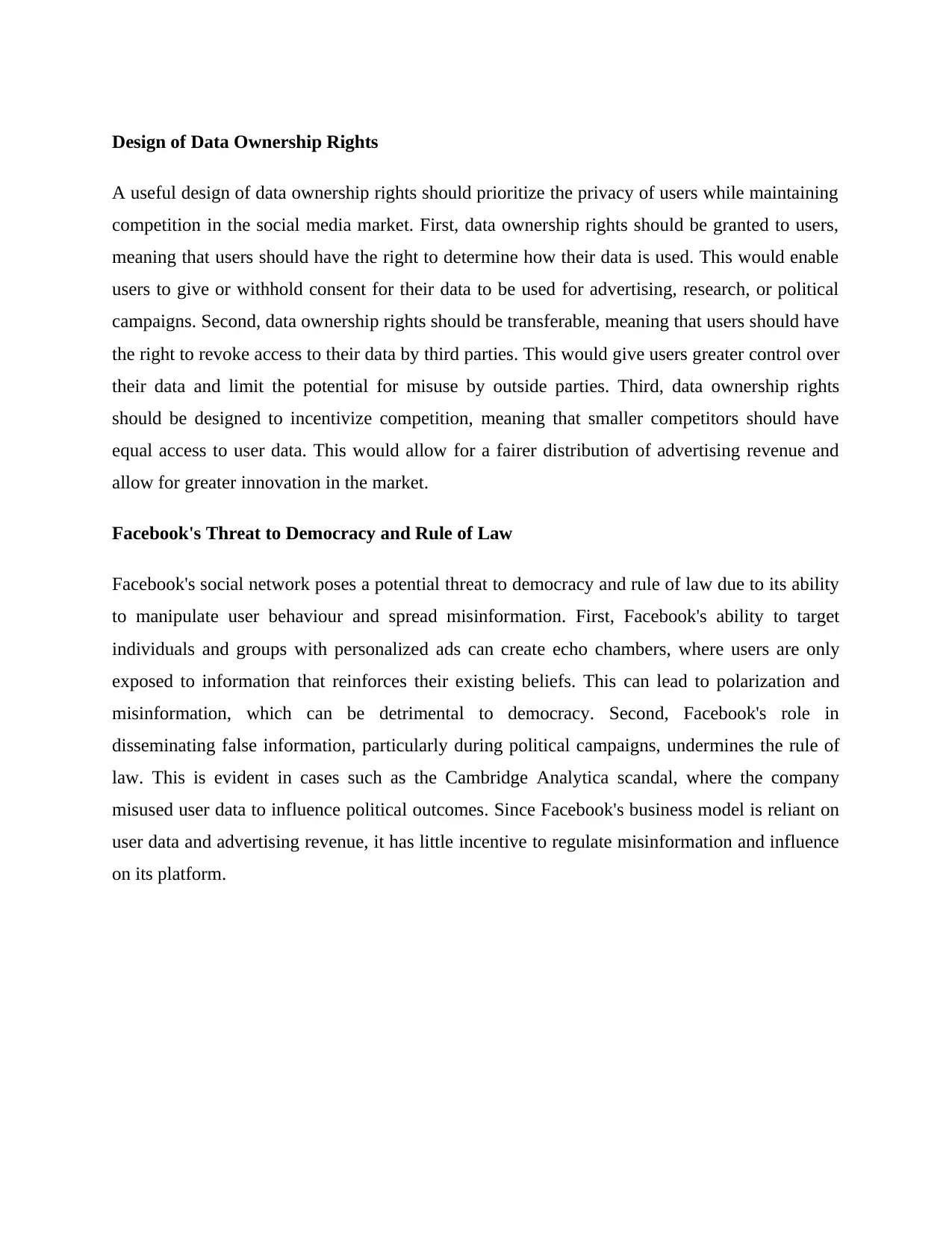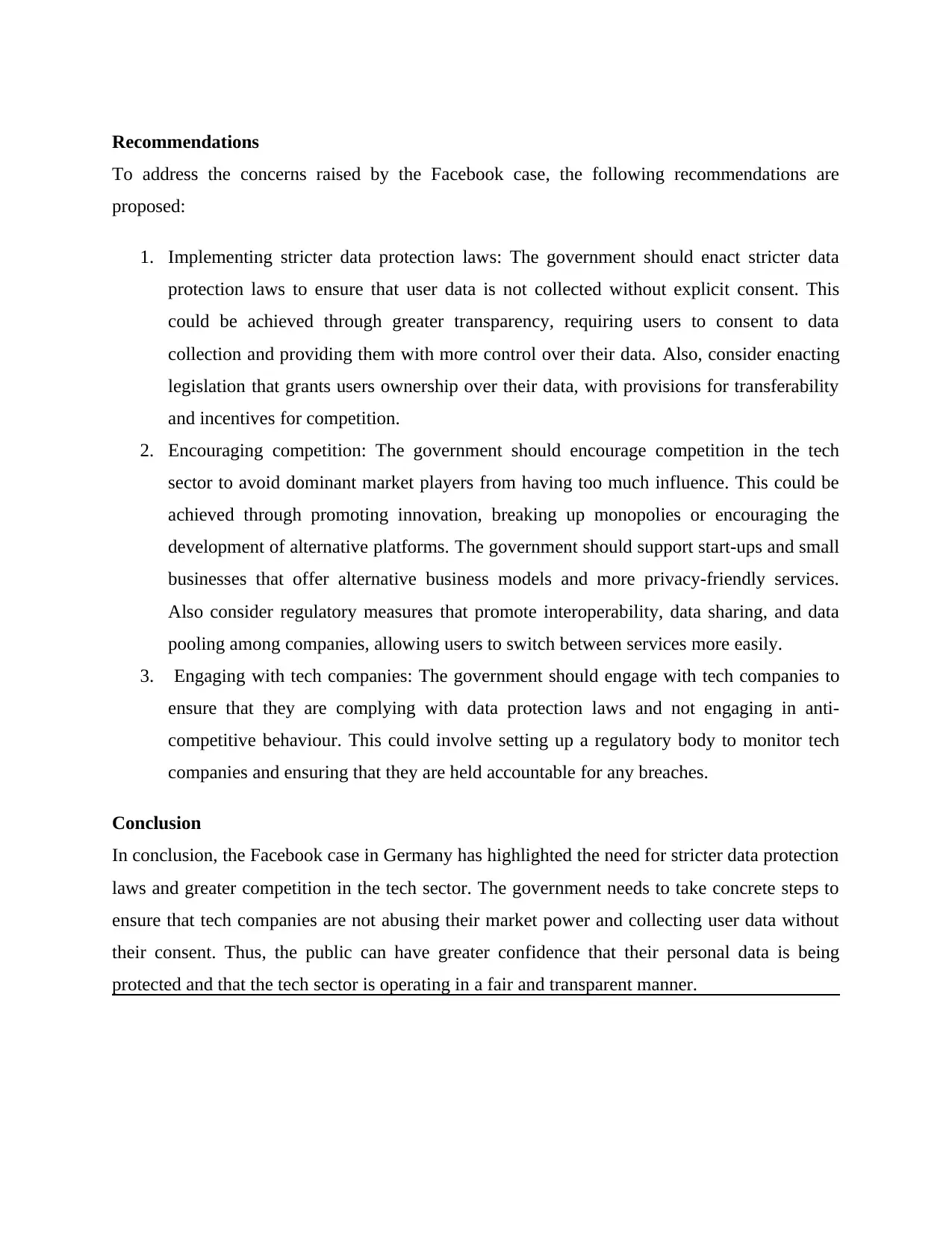Facebook Case Study: Data Privacy, Market Dominance & Legal Review
VerifiedAdded on 2023/06/15
|5
|1220
|303
Report
AI Summary
This report addresses the Facebook case in Germany, focusing on the implications of Facebook's data collection practices and its dominant market position. The German Federal Cartel Office's investigation revealed that Facebook abused its power by collecting user data without explicit consent, raising concerns about data privacy and competition. The report examines the competition problems inherent in Facebook's digital business model, particularly the lack of user control over their data and the potential for manipulation and misinformation. It proposes recommendations, including stricter data protection laws, encouraging competition in the tech sector, and engaging with tech companies to ensure compliance and accountability. The analysis concludes that concrete steps are needed to protect user data, promote fair competition, and ensure transparency in the tech sector to safeguard democracy and the rule of law.

To: The Prime Minister
From: Mavis Bio Asieduaa
Subject: Facebook Case in Germany
Introduction
Introduction Social media platforms have transformed the way people communicate and interact.
These platforms, however, are not without their challenges. Data privacy and ownership are
increasingly becoming major concerns as users become more aware of the value of their personal
data. In this report, we will assess the German Facebook case and recommend measures to
regulate data processing in our country.
The recent Facebook case in Germany has become a matter of concern for both the government
and the public. The Federal Cartel Office in Germany found that Facebook had abused its
dominant position by collecting user data without their consent. In response to this, the
government needs to take concrete steps to ensure that such practices are not repeated in the
future.
Background
Facebook is a social network platform with over 2 billion active users worldwide. The company
has been criticized in the past for its privacy policies and the way it handles user data. In 2018,
the Cambridge Analytica scandal broke out, which revealed that the data of millions of Facebook
users had been harvested without their consent. Following this, the German Federal Cartel Office
launched an investigation against Facebook and found that the company had abused its market
power by collecting user data without their explicit consent.
From: Mavis Bio Asieduaa
Subject: Facebook Case in Germany
Introduction
Introduction Social media platforms have transformed the way people communicate and interact.
These platforms, however, are not without their challenges. Data privacy and ownership are
increasingly becoming major concerns as users become more aware of the value of their personal
data. In this report, we will assess the German Facebook case and recommend measures to
regulate data processing in our country.
The recent Facebook case in Germany has become a matter of concern for both the government
and the public. The Federal Cartel Office in Germany found that Facebook had abused its
dominant position by collecting user data without their consent. In response to this, the
government needs to take concrete steps to ensure that such practices are not repeated in the
future.
Background
Facebook is a social network platform with over 2 billion active users worldwide. The company
has been criticized in the past for its privacy policies and the way it handles user data. In 2018,
the Cambridge Analytica scandal broke out, which revealed that the data of millions of Facebook
users had been harvested without their consent. Following this, the German Federal Cartel Office
launched an investigation against Facebook and found that the company had abused its market
power by collecting user data without their explicit consent.
Paraphrase This Document
Need a fresh take? Get an instant paraphrase of this document with our AI Paraphraser

Implications
The German Federal Cartel Office's decision has far-reaching implications, not just for Facebook
but for other tech companies as well. The ruling sets a precedent that companies with dominant
market positions cannot collect user data without their explicit consent. The decision has also
raised concerns about the monopoly power of big tech companies and their ability to influence
public discourse.
Competition Problems of Facebook's Digital Business Model
Facebook's digital business model creates competition problems that stem from the control of
user-generated data and dominance in the social media market. First, the company's vast user-
generated data enables it to analyse and target individuals and groups with personalized ads. This
gives Facebook an unfair competitive advantage over smaller competitors who are unable to
access similar data. Second, Facebook's control of the social media market restricts competition
by limiting the entry of new firms seeking to offer similar services. Facebook's market power
means that it can acquire potential rivals or copy their features, to eliminate competition. This
has led to the emergence of "Facebook fatigue," where users feel trapped by the platform's
dominance and lack of competition.
The Main Problem of Facebook's Digital Business Model
The main problem of Facebook's digital business model is the lack of control over user-
generated data. Facebook retains ownership of users' data, which makes it difficult for users to
determine how their data is used. Since Facebook's business model is reliant on targeted
advertising, users' data is the core component of its revenue stream. This has led to various
privacy concerns, particularly when it comes to the misuse of user data for political campaigns,
such as the Cambridge Analytica scandal. Furthermore, Facebook's ability to collect and analyse
vast amounts of user data means that it has unparalleled control over user behaviour, which
raises concerns about the potential for manipulation.
The German Federal Cartel Office's decision has far-reaching implications, not just for Facebook
but for other tech companies as well. The ruling sets a precedent that companies with dominant
market positions cannot collect user data without their explicit consent. The decision has also
raised concerns about the monopoly power of big tech companies and their ability to influence
public discourse.
Competition Problems of Facebook's Digital Business Model
Facebook's digital business model creates competition problems that stem from the control of
user-generated data and dominance in the social media market. First, the company's vast user-
generated data enables it to analyse and target individuals and groups with personalized ads. This
gives Facebook an unfair competitive advantage over smaller competitors who are unable to
access similar data. Second, Facebook's control of the social media market restricts competition
by limiting the entry of new firms seeking to offer similar services. Facebook's market power
means that it can acquire potential rivals or copy their features, to eliminate competition. This
has led to the emergence of "Facebook fatigue," where users feel trapped by the platform's
dominance and lack of competition.
The Main Problem of Facebook's Digital Business Model
The main problem of Facebook's digital business model is the lack of control over user-
generated data. Facebook retains ownership of users' data, which makes it difficult for users to
determine how their data is used. Since Facebook's business model is reliant on targeted
advertising, users' data is the core component of its revenue stream. This has led to various
privacy concerns, particularly when it comes to the misuse of user data for political campaigns,
such as the Cambridge Analytica scandal. Furthermore, Facebook's ability to collect and analyse
vast amounts of user data means that it has unparalleled control over user behaviour, which
raises concerns about the potential for manipulation.

⊘ This is a preview!⊘
Do you want full access?
Subscribe today to unlock all pages.

Trusted by 1+ million students worldwide

Design of Data Ownership Rights
A useful design of data ownership rights should prioritize the privacy of users while maintaining
competition in the social media market. First, data ownership rights should be granted to users,
meaning that users should have the right to determine how their data is used. This would enable
users to give or withhold consent for their data to be used for advertising, research, or political
campaigns. Second, data ownership rights should be transferable, meaning that users should have
the right to revoke access to their data by third parties. This would give users greater control over
their data and limit the potential for misuse by outside parties. Third, data ownership rights
should be designed to incentivize competition, meaning that smaller competitors should have
equal access to user data. This would allow for a fairer distribution of advertising revenue and
allow for greater innovation in the market.
Facebook's Threat to Democracy and Rule of Law
Facebook's social network poses a potential threat to democracy and rule of law due to its ability
to manipulate user behaviour and spread misinformation. First, Facebook's ability to target
individuals and groups with personalized ads can create echo chambers, where users are only
exposed to information that reinforces their existing beliefs. This can lead to polarization and
misinformation, which can be detrimental to democracy. Second, Facebook's role in
disseminating false information, particularly during political campaigns, undermines the rule of
law. This is evident in cases such as the Cambridge Analytica scandal, where the company
misused user data to influence political outcomes. Since Facebook's business model is reliant on
user data and advertising revenue, it has little incentive to regulate misinformation and influence
on its platform.
A useful design of data ownership rights should prioritize the privacy of users while maintaining
competition in the social media market. First, data ownership rights should be granted to users,
meaning that users should have the right to determine how their data is used. This would enable
users to give or withhold consent for their data to be used for advertising, research, or political
campaigns. Second, data ownership rights should be transferable, meaning that users should have
the right to revoke access to their data by third parties. This would give users greater control over
their data and limit the potential for misuse by outside parties. Third, data ownership rights
should be designed to incentivize competition, meaning that smaller competitors should have
equal access to user data. This would allow for a fairer distribution of advertising revenue and
allow for greater innovation in the market.
Facebook's Threat to Democracy and Rule of Law
Facebook's social network poses a potential threat to democracy and rule of law due to its ability
to manipulate user behaviour and spread misinformation. First, Facebook's ability to target
individuals and groups with personalized ads can create echo chambers, where users are only
exposed to information that reinforces their existing beliefs. This can lead to polarization and
misinformation, which can be detrimental to democracy. Second, Facebook's role in
disseminating false information, particularly during political campaigns, undermines the rule of
law. This is evident in cases such as the Cambridge Analytica scandal, where the company
misused user data to influence political outcomes. Since Facebook's business model is reliant on
user data and advertising revenue, it has little incentive to regulate misinformation and influence
on its platform.
Paraphrase This Document
Need a fresh take? Get an instant paraphrase of this document with our AI Paraphraser

Recommendations
To address the concerns raised by the Facebook case, the following recommendations are
proposed:
1. Implementing stricter data protection laws: The government should enact stricter data
protection laws to ensure that user data is not collected without explicit consent. This
could be achieved through greater transparency, requiring users to consent to data
collection and providing them with more control over their data. Also, consider enacting
legislation that grants users ownership over their data, with provisions for transferability
and incentives for competition.
2. Encouraging competition: The government should encourage competition in the tech
sector to avoid dominant market players from having too much influence. This could be
achieved through promoting innovation, breaking up monopolies or encouraging the
development of alternative platforms. The government should support start-ups and small
businesses that offer alternative business models and more privacy-friendly services.
Also consider regulatory measures that promote interoperability, data sharing, and data
pooling among companies, allowing users to switch between services more easily.
3. Engaging with tech companies: The government should engage with tech companies to
ensure that they are complying with data protection laws and not engaging in anti-
competitive behaviour. This could involve setting up a regulatory body to monitor tech
companies and ensuring that they are held accountable for any breaches.
Conclusion
In conclusion, the Facebook case in Germany has highlighted the need for stricter data protection
laws and greater competition in the tech sector. The government needs to take concrete steps to
ensure that tech companies are not abusing their market power and collecting user data without
their consent. Thus, the public can have greater confidence that their personal data is being
protected and that the tech sector is operating in a fair and transparent manner.
To address the concerns raised by the Facebook case, the following recommendations are
proposed:
1. Implementing stricter data protection laws: The government should enact stricter data
protection laws to ensure that user data is not collected without explicit consent. This
could be achieved through greater transparency, requiring users to consent to data
collection and providing them with more control over their data. Also, consider enacting
legislation that grants users ownership over their data, with provisions for transferability
and incentives for competition.
2. Encouraging competition: The government should encourage competition in the tech
sector to avoid dominant market players from having too much influence. This could be
achieved through promoting innovation, breaking up monopolies or encouraging the
development of alternative platforms. The government should support start-ups and small
businesses that offer alternative business models and more privacy-friendly services.
Also consider regulatory measures that promote interoperability, data sharing, and data
pooling among companies, allowing users to switch between services more easily.
3. Engaging with tech companies: The government should engage with tech companies to
ensure that they are complying with data protection laws and not engaging in anti-
competitive behaviour. This could involve setting up a regulatory body to monitor tech
companies and ensuring that they are held accountable for any breaches.
Conclusion
In conclusion, the Facebook case in Germany has highlighted the need for stricter data protection
laws and greater competition in the tech sector. The government needs to take concrete steps to
ensure that tech companies are not abusing their market power and collecting user data without
their consent. Thus, the public can have greater confidence that their personal data is being
protected and that the tech sector is operating in a fair and transparent manner.
1 out of 5
Related Documents
Your All-in-One AI-Powered Toolkit for Academic Success.
+13062052269
info@desklib.com
Available 24*7 on WhatsApp / Email
![[object Object]](/_next/static/media/star-bottom.7253800d.svg)
Unlock your academic potential
Copyright © 2020–2026 A2Z Services. All Rights Reserved. Developed and managed by ZUCOL.




